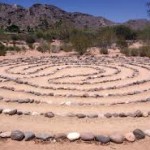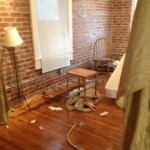A particular pleasure in the early morning hours, when I visit my family in the high desert of California, is to walk the labyrinth my son and daughter-in-law built in their desert-landscaped backyard. I didn’t see the space before they began what must have been a mammoth construction job – removing debris, pulling weeds, relocating sand and rocks to create a smooth level surface. Walking the curvilinear pathways of their version of this ancient ritual space this morning I marveled at the careful and painstakingly precise placement of rocks and solar lights directing my footsteps.

This sense of order may have seemed particularly satisfying to me because a recent event had caused me to become extremely aware of its opposite. Text messages, emails and phone calls throughout the weekend were continually informing me of the details of the vandalism and destruction that had taken place in a condo that a group of us had recently remodeled in northern California. After the verbal descriptions came the images of towel racks ripped from the walls, a floor covered with broken glass, and blood splattered on furniture, fixtures and walls. Just viewing this senseless devastation brought visceral pain to my stomach and a taste of disgust to my mouth. A man who had done repair work on the place told me when he entered the room and saw the scene, he felt as though he had been raped. 
My mind darts about to understand why someone would do such a thing. What could be gained by destroying what others had so carefully and lovingly assembled? A woman who has stayed in the space while visiting her brother in a nearby hospital described it as a “quiet Oasis,” another guest used the words, “comfortable and elegant.” Where does the impulse come from to replace beauty and order with filth, ugliness and disarray?
Does the drug paraphernalia found at the scene of the crime hold the answer? Just as I walk the ordered space of the labyrinth to access my own inner peace, others use substances to change their brain chemistry in a different direction. As a culture, we all pay the price for actions taken under the influence of recreational drugs gone awry.
 Fortunately there are people willing to work to clean up the mess and reconstruct the space back to its previous orderly condition. If we use a wider lens to view the impact of drug use on families, communities and nations, reconstruction teams aren’t going to be short on assignments any time soon. But as one friend texted me in the midst of that day’s discouragement – “Remember, there is not enough darkness to overcome your light.”
Fortunately there are people willing to work to clean up the mess and reconstruct the space back to its previous orderly condition. If we use a wider lens to view the impact of drug use on families, communities and nations, reconstruction teams aren’t going to be short on assignments any time soon. But as one friend texted me in the midst of that day’s discouragement – “Remember, there is not enough darkness to overcome your light.”

